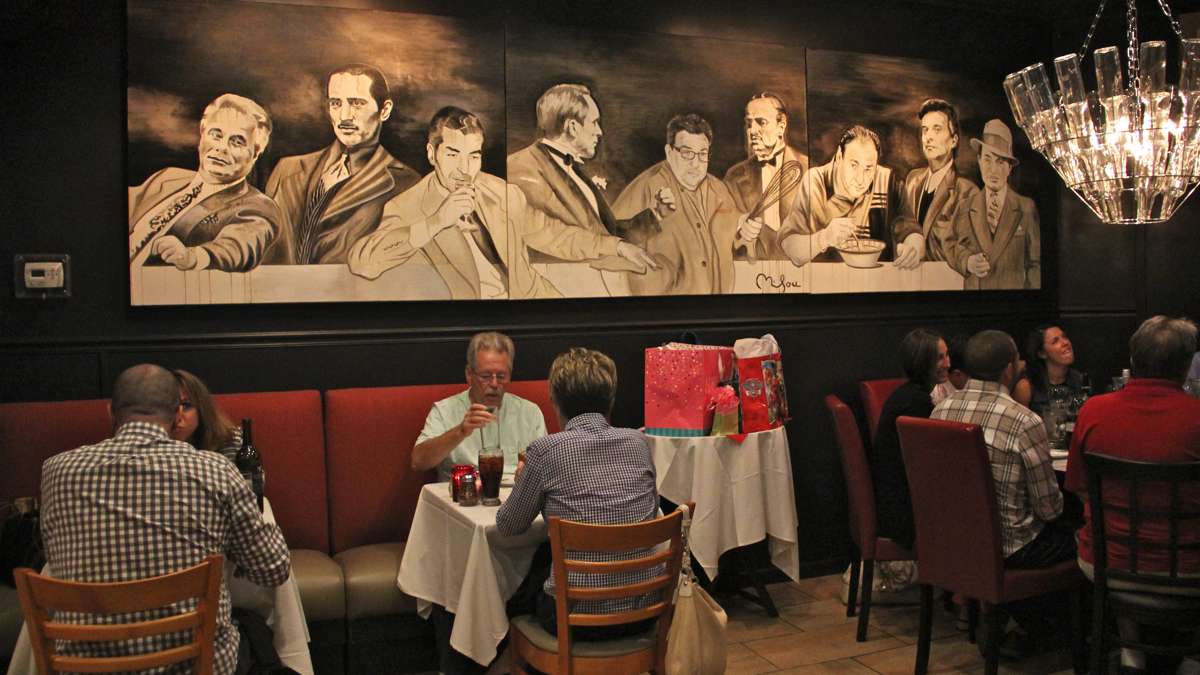Will Angelo Lutz’s past ever let him have a successful future?
ListenAngelo Lutz, a boisterous South Philadelphia man who served seven years in federal prison after a mob-trial rackeetering conviction, has a question for the world: When will he be done repaying his debt to society?
Best known as the guy who didn’t shy away from cameras throughout the 2001 trial that shipped him out (along with six co-defendants, including a gentleman named Joseph Merlino) to various prisons “to do his time as as a man,” Lutz has reinvented himself as a successful restaurateur.
His restaurant in Collingswood, N.J. — in a not-so-subtle nod to his past, the Kitchen Consigliere Cafe features what can only be termed a mob motif — has generated a respectable amount of buzz (and acceptable profits) since opening in 2010.
Lutz’s brand-building efforts include a series of cooking videos on Philly.com, stories on local-news programs, a crowdfunding effort which drew international attention and a TV-show pitch — along with appearances on QVC and the Food Network’s “Cutthroat Kitchen.”
That trajectory would be the envy of many who struggle to get culinary businesses up, running and in the public eye.
During a recent interview over lunch in South Jersey, though, Lutz painted the picture of a businessman who finds himself unable to expand beyond a one-restaurant operation in a dry town. Why? Because of a penal system that never truly frees convicted felons from its grasp even after they fulfill the terms of their release.
“I capitalized on my so-called ‘microcelebrity,’ but it’s been a struggle since day one. That won’t be the case in four or five years, but that’s how it is today,” said Lutz, who bulldozed through financial constraints to move from a 30-seat, off-the-beaten path location to the spacier current spot along centerpiece Haddon Avenue. “I did all this against the odds.”
Lutz isn’t content to be a local success. He wants to grow his business and personal brand. He aspires to be a culinary star.
But he, his business manager Martin Schieken, longtime mob-writer George Anastasia and Food Network personality/friend Marc Summers all maintain that America’s current legal system makes it darn near impossible for Lutz to so.
What seemingly irks him most is the fact that his predicament has made it impossible to accept a pending offer to open a Kitchen Consigliere location in a Pennsylvania casino. (More on that later.)
“You told me to go to jail, and I served 84 months. I’m not saying that when I come back, you should open the gates of heaven to me, but as a convicted felon, I can’t get [Small Business Adminstration or bank] loans or a liquor license,” Lutz said. “You’re set up to fail when you come out of jail. I can’t succeed with the way the laws are.”
Table setting
Having covered organized crime for decades, Anastasia is a pre-eminent authority on the local mob. To hear him tell it, Lutz stands apart from the crowd.
“You know how many of these guys I’ve written about. Nobody has done what he’s done,” said Anastasia of Lutz establishing himself as a successful, legitimate businessman. “You have to have that will, that drive to do it, but most don’t want to be bothered.
“Some of them want to go back and be what they were, because that’s what their identity is. Angelo’s got more going for him than that. He doesn’t need to be a gangster.”
Lutz maintains that he “never was a gangster.” He adds that said his post-prison life choices are all motivated by the pain of having been in prison when his mother died.
He said authorities made an offer: Tell us what you know about one of your co-defendants and we’ll let you out to go to her funeral. No go, said Lutz. That was about honor, he says — and the fact that he says he didn’t have any information to offer.
His cousin sent a picture of Lutz’s mother in a coffin, which he hung in his cell. That sticks with him to this day, he said.
During a 2009 lunch at a South Philadelphia eatery with Anastasia, Lutz formulated the idea to open a restaurant of his own. After all, he had cooked a bunch while behind bars.
“I can do this,” said Lutz, who ultimately found a location in Collingswood to give his business venture a shot. “But I’m broke. Dead broke. No money.”
Now, banks aren’t inclined to extend loans to convicted felons, but a friend of his “found a saint” who took a high-five-figure chance on him.
He didn’t make much early on, blaming it on embezzlement that went unproven.
Schieken was a customer who has an extensive business background. Just by being around the restaurant, he saw the little things that kept the operation out of the black: For example, many under-tallied bills and free desserts distributed. Seeing promise, he came on board as a consultant at a $200/month pricetag.
“My deal is very simple: If Angelo does something illegal or immoral, I walk,” said Schieken. “I get to see the books. I get statements sent to me. I see the money go into the bank. The day that stops is the day I say, ‘Angelo, have a nice time,’ because I will not be involved.”
Vehemently shooting down unfounded rumors that unsavory money was coming into the business, Lutz and Schieken noted that they’ve gone out of their way to give back to the community by providing food and gift cards for charity events and the like.
Challenges linger
As the business established solid-enough footing, Lutz reached out to Marc Summers of the Food Network with a request: Get me on television.
Joked Lutz, “He made the critical mistake of answering the phone when I was calling him one day.”
The two soon met up, and Summers quickly realized Lutz was hemmed in by an unforgiving post-prison landscape. Martha Stewart had easier time of reacclimating because she was already rich; Lutz, however, was far from that.
A TV career, thought Lutz, emboldened by the attention he drew during the 2001 trial, could help build up capital to serve as a pathway to expand the Kitchen Consigliere into a bona fide brand. Summers saw something there.
“Here’s why I ended up getting involved: The guy has a huge personality, a natural,” Summers said. “I’m very selective about who I take to [meet executives at the Food Network] but he convinced me that he was a reality star waiting to explode. I’m not going over there with a ‘maybe.'”
Recounting a meeting with a trio of executives, Summers said Lutz’s performance “was superstar time. It was a cold room, but within five minutes, he had them in the palm of his hand.”
The rub? It comes down to appearances. Not legal. Physical. Lutz’s Mummer-based nickname was “Golden Buddha” for a reason.
“When we were walking out, they told me they couldn’t put him on TV because he weighs too much. That he won’t go over well with our audience,” recalled Summers. “I said to him, ‘You gotta lose weight.’ He’s facing enough obstacles; don’t let this be one of them.”
Lutz at first took the advice to heart and briefly launched an exercise regimen that has since fallen to the wayside. When you’re the hands, brains and face of a business, and money is tight because of circumstances beyond your control, gym time is scarce.
“The ball in his court now. If he could drop 100 pounds, he’d have a better shot” at landing a cooking-show deal, Summers said. “Unfortunately, we judge people based on these things.
“What they don’t understand about Angelo is that he was accepted and went to Wharton. Now, he chose to go deal blackjack instead. He made some wrong choices, but I think he deserves an opportunity. I haven’t found any networks that agree with me, but I’ll continue to help as much as I can. I’ll go to the governor, to the President [seeking a pardon] and say, ‘C’mon. Sit and talk to the guy for 20 minutes. You’ll see.'”
Being typecast as a one-trick former-mob pony doesn’t help when you’re trying to establish business contacts either. Lutz said he wishes people would see him for his post-prison successes rather than as the pre-prison bookmaker and gambler. In fact, it’s already cost him a couple of opportunities.
“Through guts and hard work, he got the restaurant open,” said Schieken. “Now, we’re open and doing well with the restaurant. He pays his taxes. He gives back to the community. He helps any employee who needs help.
“Where does the punishment stop for somebody who served their time? What do we have to do to mitigate the problem? Who do we talk to? Who do we see? He’s set up to fail, but he didn’t fail. We have a person who is being continually persecuted and punished.”
Waiting for the big break
To Anastasia, who is working on a book with Lutz, the restaurateur is a great American success story.
“They talk about how prison’s supposed to rehabilitate. Well, find me a better example than Angelo, yet he’s stymied continually because the system is stacked against him from the get-go,” said Anastasia. “This is about the system. The system is screwed up.
“Let’s be realistic: If Angelo wanted to get money, he knows where he can go get money. He could just go back to the old ways, but he didn’t do that!”
What Lutz has going for him are established contacts who help with both his entertainment-world aspirations and his funding hurdles.
“Right now, I know how to make legitimate money. I don’t make a lot of it, but I pay my bills,” Lutz said. “The point is: I don’t like getting up every day at 4 a.m. for count. Sometimes, when it gets really rough, I say I’d take a three-month hit right now just to get away and clear my mind, as long as I knew this place could run without me here.”
It’s just that getting to here isn’t easy for him.
Case in point: Though he won’t publicly name names, Lutz said he has a pending offer to open up a location in a Pennsylvania casino, the type of expansion that could snowball and open more financial doors.
So, what’s the problem?
A little thing called the Pennsylvania Gaming Control Board exclusion list, on which Lutz’s name has appeared since 2013. It bars him from entering the building in which his restaurant would be located.
Upon release, Lutz was gambling at Harrah’s Chester until the day a retired FBI agent showed up at his front door to serve him with exclusion papers.
Rather than fight a seemingly unwinnable fight, he voluntarily signed off on not going into casinos for three years. In retrospect, that decision harmed him more than it helped.
“Now I got this deal, ready to go. I could sign a deal tomorrow and have a Kitchen Consigliere in a licensed Pennsylvania facility,” he said, “but, I’m not allowed in the building and [the casino contact] said I’d have to be there for it to work.”
He’s spoken to attorneys about what it would take to get off the list on which he’ll appear until he’s able to appeal in 2016 and found it to be cost-prohibitive.
Lutz is none too happy to be considered a worse risk than “people with teardrop tattoos walking into casinos with inch-high stack of hundreds” since those bills are dirtier than the restaurant dollars with which he’d play table games before his ban.
It’s even trickier to position yourself as a post-release martyr who tries to convince people the rules are too strict when post-release felons “with rap sheets longer than my arms” end up going to a GameStop location and killing a police officer.
So today, Angelo Lutz is confined by a past that not only dictates what he can and can’t do, but serves as the motif of the restaurant that he wants to use to surmount that past. It’s a tricky dichotomy, to say the least.
The man who apparently reinvented himself returned to a common refrain when asked to summarize his current lot in life.
“Yeah, I made mistakes and I can’t hide from it; [the mob background] is my brand,” he said. “Bill Clinton can lie to a grand jury. Hillary can’t run away from Benghazi. It is what it is. My past is my past. It’s always going to be a part of who I am, but I’m not going to let it dictate who I become.
“People are gonna say, ‘Ah, f— that guy. He did what he did. He made his own bed. Fine. But I’m trying to make amends, to do the right thing, and I’m set up for failure now. What price do I have to pay? When will it stop?”
WHYY is your source for fact-based, in-depth journalism and information. As a nonprofit organization, we rely on financial support from readers like you. Please give today.






